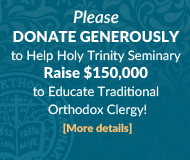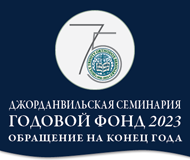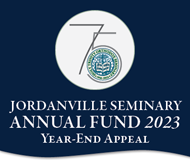News
-
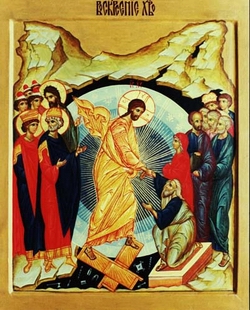
PASCHAL EPISTLE
23 April 2011
To the clergy and the entire beloved flock of the Canadian Diocese of the Russian Orthodox Church Abroad
CHRIST IS RISEN!
Honorable fathers, beloved in the Lord brothers and sisters!
“Now all things are filled with light, heaven and earth, and the lower regions! Let all creation therefore celebrate the arising of Christ, for in Him it is made firm,” – exclaims the Holy Church on this Great day of the Glory of the Lord.
The Resurrection of Christ opened before us the gates of eternity. It was said in the pious poetic tradition of our fathers, who dwelt in the land of Holy Russia, that from the first day of the Bright Resurrection of Christ, the gates of heaven open and stay open until the last day of the Bright Week. More than that, even the torments of hell cease and quiet down, and sinners are given rest even until Pentecost.
This shows with what grace-filled spiritual uplifting the Russian people greeted the Feast of feasts – the Pascha of Christ. Do we follow their example? Are we enveloped with the joyous all-forgiving state of mind, as it is spoken of in the homily of St. John Chrysostom, which is read at the Paschal matins? Yet, this Paschal feeling is the gift of a special mystical grace, which the faithful receive from the Lord, as a certain foretaste of the heavenly joy, the joy of the Unwaning Light. Compared to this joy, how insignificant and pitiful must be our quarrels and offenses, our divisions into conflicting groups, our sinful remembrance of wrongs, which, according to the words of the Most Blessed Metropolitan Anthony, founder of our Russian Church Abroad, “Entrance into the Heavenly Kingdom is closed to us.”
In the last year, we became witnesses of the most cruel raging of the elements: destructive floods, dreadful frequent earthquakes, which, in a blinking of an eye, destroy, it appears, the most perfect human achievements. This reminds us of the fact that all of us, as a Russian saying says, walk under God, and none knows when the Lord will call us, and all of this is the fulfillment of the gospel words of the Savior about the signs of the times.
Therefore, Pascha – this type of the future, eternal Pascha – reminds us of the necessity of always being attentive to our salvation, so that we, living here on earth, would never forget all the needy with our mercy, whoever these needy may be, in the times when they are met with sorrow. Then, we also will be vouchsafed an opportunity to fulfill the commandments of Christ by good works and pious life, and to be partakers of the eternal Paschal joy in the Risen Lord.
Let us remember, beloved brothers and sisters, that “Today – on this very day – a sacred Pascha has appeared unto us, a Pascha new and holy, a Pascha mystical, a Pascha all-honorable” and let us repeat in our hearts the tender and triumphant words of the Apostle Paul: “My brethren, rejoice in the Lord always, and again I say rejoice… the Lord is near… and the peace of God, which is beyond all understanding, will keep your hearts and your thoughts in Christ Jesus” (Phil. 4:4-7).
Truly Christ Is Risen!
Gabriel
Bishop of Montreal & CanadaPascha of Christ, 2011
-
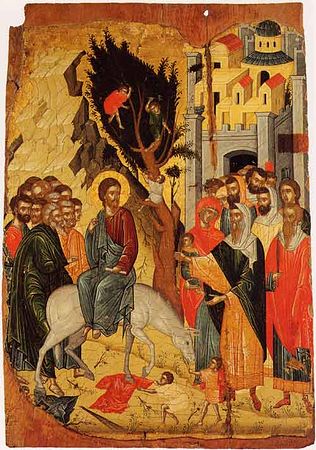
April 4/17 – Entry of the Lord into Jerusalem (Palm Sunday)
16 April 2011
Rejoice greatly, O daughter of Sion; proclaim it aloud, O daughter of Jerusalem; behold, the King is coming to thee, just, and a Savior; he is meek and riding on an ass, and a young foal (Zach. 9:9).
Entry of The Lord Jesus Christ in JerusalemThe prophet of God pronounced this prophecy over four hundred years before the event that we commemorate and celebrate today. Having completed His preaching on the earth, our Lord Jesus Christ made His triumphant entry into the royal city of Jerusalem, into the city where the true God was worshipped, a city in most ways Godly. The Lord made this entry as the King and victor, in order to finish His service by a decisive exploit: destroying death by death; removing the curse from the human race by taking this curse upon Himself. He made His entry into the royal city on the colt of an ass, whereon yet never man sat (Lk. 19:30), in order to restore to mankind the royal dignity which our forefather had wasted; to restore this dignity by ascending the cross. The unbroken colt was tamed beneath the wondrous Rider. The Apostles placed their garments upon the colt; great multitudes of people ran ahead to meet the Lord and walk alongside Him, shouting in their ecstasy, Hosanna to the son of David: Blessed is he [the king (Lk. 19:38)] that cometh in the name of the Lord; Hosanna in the highest (Mt. 21:9). The Lord is proclaimed King in the name of the Lord at His own beckoning—not accidentally, and not by conscious human will. In the course of four days, those same people who that day proclaimed Him King will cry, Away with him, away with him, crucify him… We have no king but Caesar (Jn. 19:15).
What is the significance of the Lord’s riding into Jerusalem on an unbroken colt? According to the explanation of the holy fathers, this has a deep, prophetic meaning. The all-seeing Lord already saw the Jews’ approaching final apostasy from God. He announced this apostasy even back when the Law was given to the Israelites on Mt. Sinai, through the lips of the inspired Law-giver. They have sinned, said Moses of the Jews’ future sin against the God-man, as if he were speaking of something already done. They have sinned, not pleasing him; spotted children, a froward and perverse generation. Do ye thus recompense the Lord? (Deut. 32:5–6). It is a nation that has lost counsel, neither is there understanding in them. They had not sense to understand: let them reserve these things against the time to come (Deut. 32:28–29). For their vine is of the vine of Sodom, and their vine-branch of Gomorrha (Deut. 32:32). While to the contrary: Rejoice, ye heavens, with him—the Son of God—and let all the angels of God worship him; rejoice ye Gentiles, with his people, and let all the sons of God strengthen themselves in him (Deut 32:43). The entry into Jerusalem upon an unbroken colt is a repetition of Moses’ prophecy—not in words, but in symbol. Moses foretold that the Gentiles would rejoice in the Lord, but the Jews would be rejected. Here, the unbroken colt, whereon yet never man sat (Lk. 19:30), is an image of the Gentiles. The Apostles’ garments are Christ’s teachings by which they would instruct the Gentiles, and the Lord seated Himself spiritually upon the Gentiles, making them God. He led them into Jerusalem, to the bosom of the Church, to the eternal city of God not made by the hands of men, to the city of salvation and blessedness. The rejected Jews were also present there. With their lips they cried, ”the King of Israel,” but in their soul, their Sanhedrin, they had already resolved to kill the Savior.
Here is another meaning of the colt of an ass. It is an image of every person who is led by irrational desires, deprived of spiritual freedom, attached to the passions and habits of fleshly life. Christ’s teaching looses the ass from its attachment; that is, from fulfilling its sinful and fleshly will. Then the Apostles lead the ass to Christ, place their garments upon it; the Lord seats Himself upon it and makes His entry upon it into Jerusalem. This means that the person who has left his sinful life is led to the Gospels, and is clothed as if in apostolic vestments, in the most detailed and refined knowledge of Christ and His commandments. Then the Lord seats Himself upon him by spiritually appearing to him and spiritually abiding in him, as it was His good will to promise: He that hath my commandments, and keepeth them, he it is that loveth me: and he that loveth me shall be loved of my Father, and I will love him, and will manifest myself to him (Jn. 14:21). And my Father will love him, and we will come unto him, and make our abode with him (Jn. 14:23). The Lord’s coming is accompanied by peace surpassing words and comprehension; peace that is full of grace, and worthy of the one Who grants it—the Lord. This peace is not to be compared with the natural rest of fallen man, who may feel rest and pleasure from fleshly delights, and who may consider his own insensibility, his own eternal death, to be rest. The Lord is seated upon the natural qualities of the person who has submitted to Him and has assimilated His all-holy teachings; and He leads that person into the spiritual city of God, the city of peace—into the Jerusalem created by God, and not by man.
The soul that upholds the Lord is greeted by the Holy Spirit, Who offers that soul spiritual joy which is incorruptible and eternal. Rejoice greatly, O daughter of Sion, the daughter of the Holy Church—because you belong to no one but God. Proclaim it aloud, O daughter of Jerusalem; behold, the King is coming to thee, just, and a Savior; he is meek and riding on an ass, and a young foal (Zach. 9:9). You have felt the grace-filled peace of Christ, and become a daughter of this peace; you have been renewed with spiritual youth and have come to know Christ’s Kingdom by experience. The passions are tamed in you by the grace-filled power of Rider Who steers you; your natural qualities cannot break their natural laws, they cannot go beyond their boundaries and be transformed into uncontrolled passions! Taking all your thoughts, feelings and actions from the Lord, you can and must proclaim the Name of the Lord to your brethren, and hymn Him in the midst of the Church (Ps. 21:22). As one born of the Holy Spirit and a daughter of the Spirit, you are able to behold the spiritual procession of your King, you are able to behold the righteousness of your King. He is meek and lowly in heart (Mt. 11:29), and He will guide the meek in judgment, He will teach the meek His ways (Ps. 24:9). Our God is a Spirit which is incomparable to any created spirit, as He is in all aspects infinitely different from all creatures. The holy created spirits are His thrones and chariots. He is seated and rides upon the Cherubim; He is seated and rides upon those blessed human souls who have submitted to Him and brought all their natural qualities to Him as a whole burnt offering. The King rides upon such souls, and enters the holy city of God, bringing holy souls into it also. Hosanna in the highest! Blessed is the King of Israel that cometh. Amen.
St. Ignatius (Brianchaninov)
Translated by Nun Cornelia (Rees)www.pravoslavie.ru/en
-
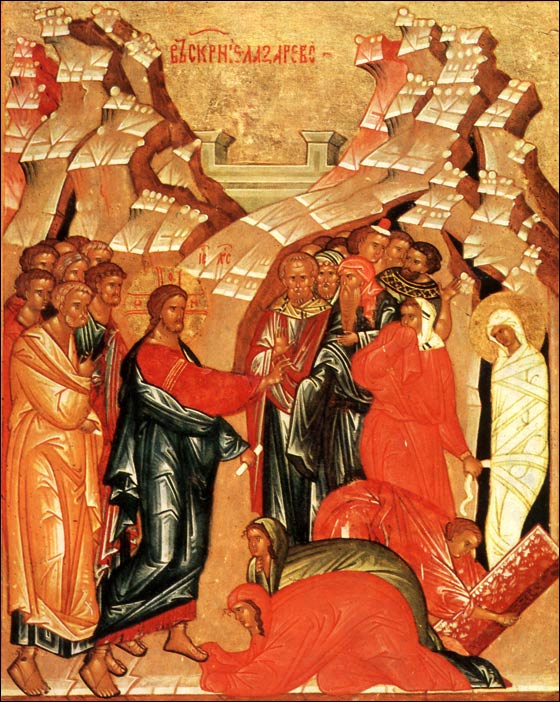
April 3/16 – Lazarus’ Saturday
16 April 2011
The story of the raising of Lazarus from the dead by Jesus Christ is found in the Gospel of John 11:1-45. Lazarus becomes ill, and his sisters, Mary and Martha send a message to Jesus stating, “Lord, he whom you love is ill.” In response to the message, Jesus says, “This illness does not lead to death; rather it is for God’s glory, so that the Son of God may be glorified through it” (vv. 1-4).
Jesus did not immediately go to Bethany, the town where Lazarus lived with his sisters. Instead He remained in the place where He was staying for two more days. After this time, He told his disciples that they were returning to Judea. The disciples immediately expressed their concern, stating that the Jews there had recently tried to stone Him (John 10:31). Jesus replied to His disciples, “Are there not twelve hours of daylight? Those who walk during the day do not stumble, because they see the light of this world. But those who walk at night stumble, because the light is not in them” (vv. 5-10).
After He said this, Jesus told his disciples that Lazarus had fallen asleep and that He was going there to wake him. The disciples wondered why He would go to wake Lazarus, since it was good for him to sleep if he was ill. Jesus, however, was referring to the death of Lazarus, and thus told the disciples directly that Lazarus was dead (vv. 11-14).
When Jesus arrived at Bethany, Lazarus had already been in the tomb four days. Since Bethany was near Jerusalem, many of the Jews had come to console Mary and Martha. When Martha heard that Jesus was approaching she went to meet Him and said to Him, “Lord, if you had been here, my brother would not have died. But even now I know that God will give you whatever you ask of Him.” Jesus told her that her brother will rise again. Martha said that she knew he would rise again in the resurrection on the last day. Jesus replied, “I am the resurrection and the life. Those who believe in me, even though they die, will live, and everyone who lives and believes in me will never die.” Jesus asked Martha if she believed this. She said to Him, “Yes, Lord, I believe that you are the Messiah, the Son of God, the one coming into the world” (vv. 17-27).
Martha returned to tell Mary that Jesus had come and was asking for her. Mary went to meet Him, and she was followed by those who were consoling her. The mourners followed her thinking that she was going to the tomb to weep there. When she came to Jesus, she fell at His feet and said, “Lord, if you had been here, my brother would not have died.” Jesus saw her weeping and those who were with her, and He was deeply moved. He asked to be taken to the tomb of Lazarus. As Jesus wept for Lazarus the Jews said, “See how He loved him.” Others wondered that if Jesus could open the eyes of the blind, He certainly could have kept Lazarus from dying (vv. 28-37).
Jesus came to the tomb and asked that the stone that covered the door be taken away. Martha remarked that Lazarus had now been in the tomb for four days and that there would be a stench. Jesus replied, “Did I not tell you that if you believed, you would see the glory of God?” The stone was taken away, and Jesus looked toward heaven and said, “Father, I thank you for having heard me, but I have said this for the sake of the crowd standing here, so that they may believe that you sent me.” When He had said this, He called out with a loud voice, “Lazarus, come out!” Lazarus walked out of the tomb, bound with the strips of burial cloth, and Jesus said, “Unbind him, and let him go” (vv. 38-44).
As a result of this miracle, many of the Jews that were present believed in Jesus. Others went and told the Pharisees what Jesus had done. In response the Pharisees and chief priests met and considered how they might arrest Him and put Him to death (v. 45ff).
This miracle is performed by Christ as a reassurance to His disciples before the coming Passion: they are to understand that, though He suffers and dies, yet He is Lord and Victor over death. The resurrection of Lazarus is a prophecy in the form of an action. It foreshadows Christ’s own Resurrection eight days later, and at the same time it anticipates the resurrection of all the righteous on the Last Day: Lazarus is “the saving first-fruits of the regeneration of the world.”
As the liturgical texts emphasize, the miracle at Bethany reveals the two natures of Christ the God-man. Christ asks where Lazarus is laid and weeps for him, and so He shows the fullness of His manhood, involving as it does human ignorance and genuine grief for a beloved friend. Then, disclosing the fullness of His divine power, Christ raises Lazarus from the dead, even though his corpse has already begun to decompose and stink. This double fullness of the Lord’s divinity and His humanity is to be kept in view throughout Holy Week, and above all on Good Friday. On the Cross we see a genuine human agony, both physical and mental, but we see more than this: we see not only suffering man but suffering God.
www.goarch.org
-
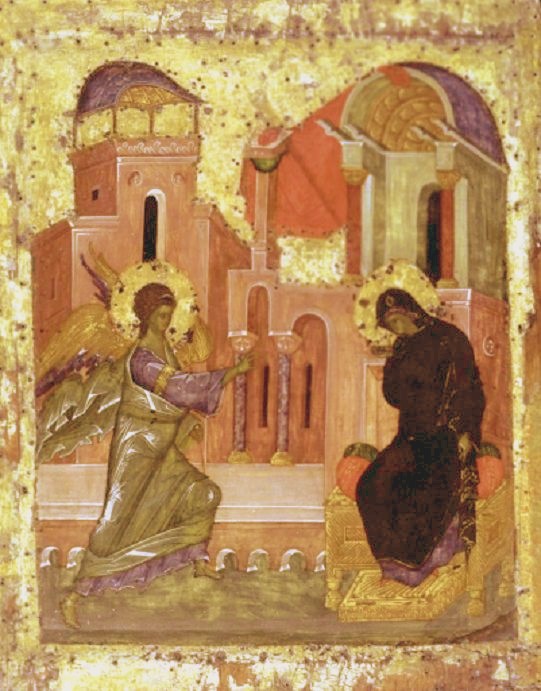
Rejoice, Thou full of grace, the Lord is with Thee! Annunciation of the Most Holy Lady Theotokos and Ever-Virgin Mary
7 April 2011
Sermon of Sainted Proklos, Patriarch of Constantinople
Our present gathering in honour of the MostHoly Virgin inspires me, brethren, to say of Her a word of praise, of benefit also for those come unto this churchly solemnity. It comprises a praise of women, a glorying of their gender, which (glory) is brought it by Her, She Who is at one same time both Mother, and Virgin. O desired and wondrous gathering! Celebrate, O nature, that wherein honour be rendered to Woman; rejoice, O human race, that wherein the Virgin be glorified. “For when sin did abound, grace did superabound” (Rom. 5: 20). The Holy Mother of God and Virgin Mary hath gathered us here, She the pure treasure of virginity, the intended paradise of Second Adam, – the locus, wherein was accomplished the co-uniting of natures, wherein was affirmed the Counsel of salvific reconciliation.
Whoever is it that ever saw, whoever heard, that within a womb the Limitless God would make habitation, Whom the Heavens cannot circumscribe, Whom the womb of a Virgin limiteth not!?
He born of woman is not only God and He is not only Man: This One born made woman, being the ancient gateway of sin, into the gateway of salvation: where evil poured forth its poison, bringing on disobedience, there the Word made for Himself a living temple, bringing in thither obedience; from whence the arch-sinner Cain sprang forth, there without seed was born Christ the Redeemer of the human race. The Lover-of-Mankind did not disdain to be born of woman, since this bestowed His life. He was not subject to impurity, being settled within the womb, which He Himself arrayed free from all harm. If perchance this Mother did not remain a Virgin, then that born of Her might be a mere man, and the birth would be no wise miraculous; but since She after birth remained a Virgin, then how is He Who is born indeed – not God? It is an inexplicable mystery, since in an inexplicable manner was born He Who without hindrance went through doors when they were locked. When confessing in Him the co-uniting of two natures, Thomas cried out: “My Lord, and my God!” (Jn. 20: 28).
The Apostle Paul says, that Christ is “to the Jews indeed scandal, and to the Gentiles yet folly” (1 Cor. 1: 23): they did not perceive the power of the mystery, since it was incomprehensible to the mind: “for had they understood, they would not have crucified the Lord of Glory” (1 Cor. 2: 8). If the Word had not settled within the womb, then the flesh would not have ascended with Him onto the Divine Throne; if for God it were disdainful to enter into the womb, which He created, then the Angels too would have disdained service to mankind.
That One, Who by His nature was not subject to sufferings, through His love for us subjected Himself to many a suffering. We believe, that Christ not through some gradual ascent towards the Divine nature was made God, but being God, through His mercy He was made Man. We do not say: “a man made God”; but we confess, that God was incarnated and made Man. His Servant was chosen for Himself as Mother by That One Who, in His essence did not have mother, and Who, through Divine foresight having appeared upon the earth in the image of man, does not have here father. How one and the same is He both without father, and without mother, in accord with the words of the Apostle (Heb. 7: 3)? If He – be only a man, then He cannot be without mother – but actually He had a Mother. If He – be God only, then He cannot be without Father – but in fact He has the Father. And yet as God the Creator He has not mother, and as Man He has not father.
We can be persuaded in this by the very name of the Archangel, making annunciation to Mary: his name – is Gabriel. What does this name mean? – it means: “God and man”. Since That One about Whom he announced is God and Man, then his very name points beforehand to this miracle, so that with faith be accepted the deed of the Divine dispensation.
To save people would be impossible for a mere man, since every man has need in the Saviour: “for all, – says Saint Paul, – have sinned, and come short the Glory of God” (Rom. 3: 23). Since sin subjects the sinner to the power of the devil, and the devil subjects him to death, then our condition did become extremely hapless: there was no sort of way to be delivered from death. There were sent physicians, i.e. the prophets, but they could only the more clearly point out the malady. What did they do? When they saw, that the illness was beyond human skill, they summoned from Heaven the Physician; one of them said “Lord, bend the heavens, and come down” (Ps. 143 [144]: 5); others cried out: “Heal me, O Lord, and I shalt be healed” (Jer. 17: 14); “restore Thine power, and come yet to save us” (Ps. 79 [80]: 3). And yet others: “For if God truly be settled with man upon the earth” (3 [1] Kings 8: 27); “speedily send before Thine tender mercy, O Lord, for we are brought very low” (Ps. 78 [79]: 8). Others said: “O woe to me, my soul! For the pious art perished from the earth, and of the upright amongst men there is none” (Mich. 7: 2). “O God, in help attend to me, O Lord, shield me with Thine help” (Ps. 69 [70]: 1). “If there be delay, endure it, for He that cometh shalt come, and not tarry” (Hab. 2: 3). “Perishing like a lost sheep: seek out Thine servant, who doth hope on Thee” (Ps. 118 [119]: 176). “For God wilt come, our God, and wilt not keep silence” (Ps. 49 [50]: 3). That One, Who by nature is Lord, did not disdain human nature, enslaved by the sinister power of the devil, the merciful God would not accede for it to be forever under the power of the devil, the Ever-Existing One came and gave in ransom His Blood; for the redemption of the race of man from death He gave up His Body, which He had accepted of the Virgin, He delivered the world from the curse of the law, annihilating death by His death. “Christ hath redeemed us from the curse of the law”, – exclaims Saint Paul (Gal. 3: 13).
Thus know, that our Redeemer is not simply a mere man, since all the human race was enslaved to sin. But He likewise is not God only, non-partaking of human nature. He had body, since if He had not clothed Himself in me, He then likewise should not have saved me. But, having settled within the womb of the Virgin, He clothed Himself in my fate, and within this womb He perfected a miraculous change: He bestowed the Spirit and received a body, That One only indeed (dwelling) with the Virgin and (born) of the Virgin. And so, Who is He, made manifest to us? The Prophet David doth point it out for thee in these words: “Blessed is He that cometh in the Name of the Lord” (Ps. 117 [118]: 26). But tell us even more clearly, O prophet, Who is He? The Lord is the God of Hosts, says the prophet: “God is the Lord, and hath revealed Himself unto us” (Ps. 117 [118]: 27). “The Word was made flesh” (Jn. 1: 14): there were co-united the two natures, and the union remained without mingling.
He came to save, but had also to suffer. What has the one in common with the other? A mere man cannot save; and God in only His nature cannot suffer. By what means was done the one and the other? Wherein that He, Emmanuel, being God, was made also Man; both this, that what He was, He saved by, – and this, that what He was made, He suffered as. Wherefore, when the Church beheld, that the Jewish throng had crowned Him with thorns, bewailing the violence of the throng, – it said: “Daughters of Zion, go forth and behold the crown, of which is crowned He of His mother” (Sng. 3: 11). He wore the crown of thorns and destroyed the judgement to suffering from the thorns. He Only is That One both in the bosom of the Father and in the womb of the Virgin; He Only is That One – in the arms of His Mother and in the wings of the winds (Ps. 103 [104]: 3); He, to Whom the Angels bowed down in worship, at that same time reclined at table with publicans. Upon Him the Seraphim dared not to gaze, and at the same time Pilate pronounced sentence upon Him. He – is That One and Same, Whom the servant did smite and before whom did tremble all creation. He was nailed to the Cross and ascended to the Throne of Glory, – He was placed in the tomb and He stretched out the heavens like a skin (Ps. 103 [104]: 2), – He was numbered amidst the dead and He emptied hell; here upon the earth, they cursed at Him as a transgressor, – there in Heaven, they exclaimed Him glory as the All-Holy. What an incomprehensible mystery! I see the miracles, and I confess, that He – is God; I see the sufferings, and I cannot deny, that He – is Man. Emmanuel opened up the doors of nature, as man, and preserved unharmed the seal of virginity, as God: He emerged from the womb thus as He entered through the announcing; the same wondrously was He both born and conceived: without passion He entered, and without impairment He emerged, as concerning this doth say the Prophet Ezekiel: “He returned me back the way of the gates of the outer sanctuaries, looking upon the east: and these had been shut. And saith the Lord to me: son of man, these gates shalt be closed, and not open, and no one go through them: for the Lord God of Israel, He Only, shalt enter and come forth, and they wilt be shut” (Ez. 44: 1-2). Here – it clearly indicates the Holy Virgin and Mother of God Mary. Let cease all contention, and let the Holy Scripture enlighten our reason, so that we too receive the Heavenly Kingdom unto all eternity. Amen.
(с) 1996-2001 by translator Fr. S. Janos.
-
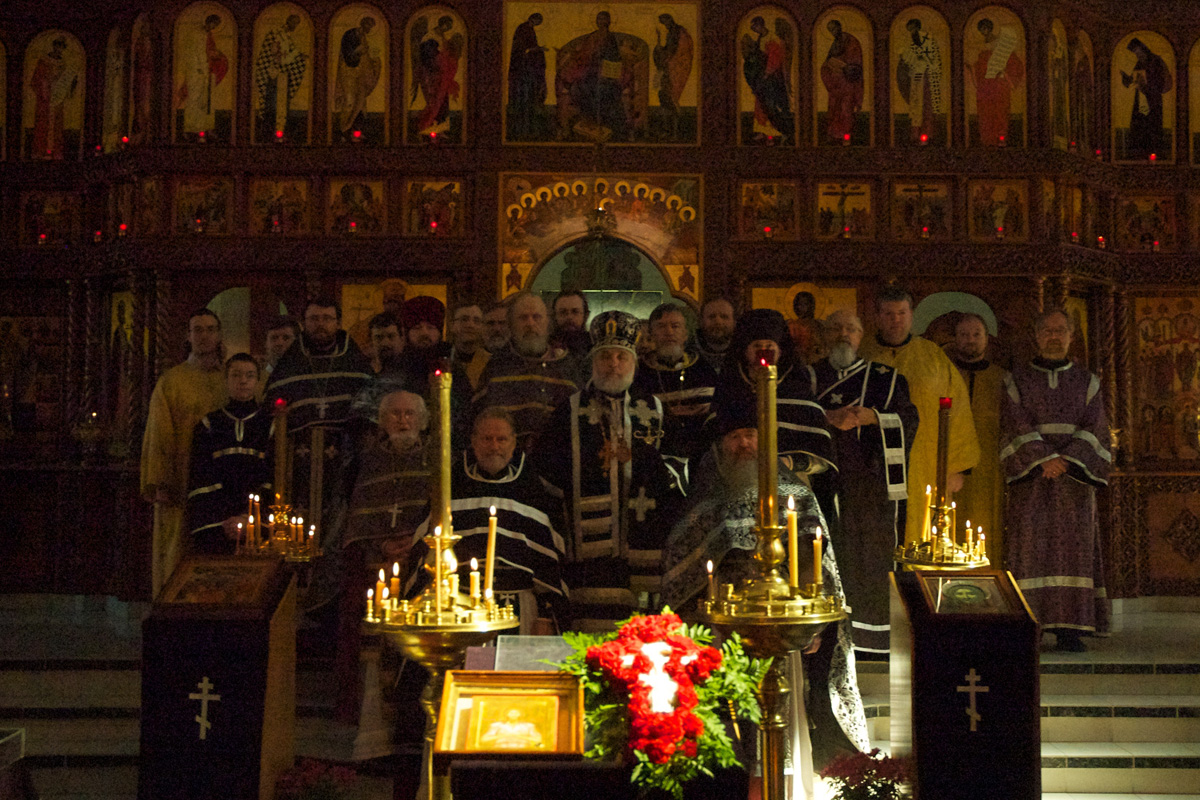
Great Lent Clergy Retreat in Canadian Diocese
4 April 2011
March 15/28 through 17/30, 2011, at the Protection Memorial of the Millennium of the Baptism of Russia Church (Ottawa, Ontario), was the time of the annual Great Lent clergy meeting of the Canadian Diocese. His Grace, Gabriel, Bishop of Montreal and Canada, presided over the divine services and meetings. A meeting of the Diocesan Council took place during the second day of the retreat. On Wednesday, March 17/30, on the day of the commemoration of St. Alexis the Man of God, Liturgy of the Presanctified Gifts was served hierarchically and was followed by a farewell brotherly meal. With the blessing of His Grace, Bishop Gabriel, participants in the retreat in Ottawa adopted the following resolution:
Resolution of the Clergy of the Canadian Diocese
We the clergy of the Canadian Diocese, having gathered for the annual Great Lent retreat and meeting at the Protection memorial church in the divinely protected city of Ottawa, under the presidency of His Grace, Gabriel, Bishop of Montreal and Canada, prayerfully wish His Eminence, the Very Most Reverend Metropolitan Hilarion, First Hierarch of the Russian Church Abroad, and His Eminence the Very Most Reverend Kirill, Archbishop of San Francisco and Western America, a speedy recovery.
In his opening remarks, His Grace, Bishop Gabriel, having reminded all of the devastating natural disasters that the Japanese people – among them are our orthodox brethren, children of the Orthodox Church of Japan – are experiencing now, told everyone about the benefit concert, which took place at St. Nicholas Cathedral in Montreal, and called upon all the parishes of our Diocese to take part, as much as possible, in the work of helping the suffering, which is pleasing to God.
We were informed that two significant events are expected to take place in our Diocese this year: ROCM and St. Herman’s conferences. We hope that Canadian youth will take active part in them.
This year, the parish of St. John of Sochava, in Lachine (Quebec), marks its centennial anniversary. The founding of this parish is connected with the ministry of His Holiness, Tikhon, Patriarch of Moscow, the Confessor, on the American continent. We hope that His Eminence, the Very Most Reverend Metropolitan Hilarion, First Hierarch of the Russian Church Abroad, will come to the celebration, to which end, he has already given his agreement.
With spiritual joy, from the report of His Grace, Bishop Gabriel, we learned that our diocese will soon be visited by the wonderworking myrrh-streaming copy of the wondrous icon of the Montreal Iveron Mother of God, which manifested itself in Hawaii. We also hope, that by the mercy of God, Orthodox Canada may be visited also by the wonderworking icon of the Mother of God “Softening of the Evil Hearts,” which was present at the Local Council of the Russian Orthodox Church in the year 2009, when His Holiness, Kirill, Patriarch of Moscow and All Russia was called to his current ministry.
Mitred Protopriest Vladimir Malchenko, rector of the Holy Trinity cathedral in Toronto, Ontario – the largest parish in the Russian Orthodox Diaspora – shared his impressions about a pilgrimage to the holy places of Moscow with his young parishioners, children, and teenagers. It was with heartfelt tenderness, that Fr. Vladimir spoke about the meeting of the young pilgrims with His Holiness, Patriarch Kirill.
All present listened with special interest to the report of Protopriest Vladimir Morin, rector of the church of the Icon of the Savior Not Made with Hands in London, Ontario, dedicated to the results and decisions of the council of bishops of the Russian Orthodox Church, which took place in Moscow, in February of this year.
As a result of this, the gathering decided to petition the Synod of Bishops of ROCOR to create in our Church Abroad also the Highest Church Council, in accordance with the decisions of the above mentioned Council of Bishops.
Following the decisions of the Council regarding the education standards for clergy, it was decided to recommend two young priests for studies at the Moscow Spiritual Academy.
Concluding the discussion of education, His Grace, Bishop Gabriel called upon all the rectors of the parishes of the Canadian Diocese to pay careful attention to their young parishioners, especially, those, drawn to the service in the Holy Altar and at the kliros. It is among them, that we must look for the future students of our Holy Trinity Seminary – the only school for the preparation of shepherds in the fold of the Russian Church Abroad. Our Seminary is officially recognized and is a part of the University of the State of New York (USA); those graduating it receive a bachelor’s diploma.
Our brotherly meeting in Ottawa was primarily dedicated to discussion of Church and divine services questions, yet at the same time we tried to pay enough attention to the current affairs of our diocese. In particular, it was decided to establish a youth committee that will be charged with the task of organizing various youth events in the diocese, working in coordination with the Committee of the Russian Orthodox Youth at the Synod of Bishops of ROCOR.
This decision, among others adopted during the meeting in Ottawa, appears to us, perhaps, the most important. In the specific conditions of the diaspora, and above that in current difficult times, the work of raising Russian Orthodox youth and children, as well as the preparation of the worthy and educated replacement of clergy, is an essential necessity for all of our dioceses. Beyond that, we are speaking about the task, the successful completion of which is the foundation for the future existence and ministry of the Russian Orthodox Church Abroad. “I shall die, but live, and I shall tell of the works of the Lord” (Psalm 117).
We offer the photos from the event for your viewing.
-
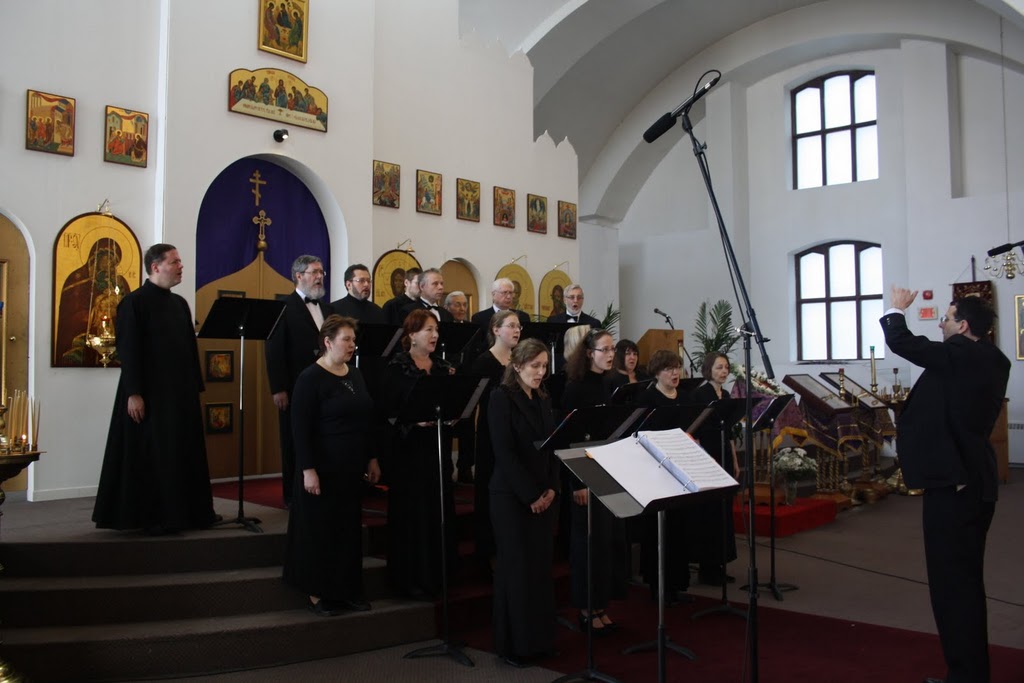
At the St. Nicholas cathedral in Montreal there was a benefit concert for the victims of the earthquake in Japan
4 April 2011
We offer you the photographs from the event taken by matushka Alexandra Platonow-Metni.
